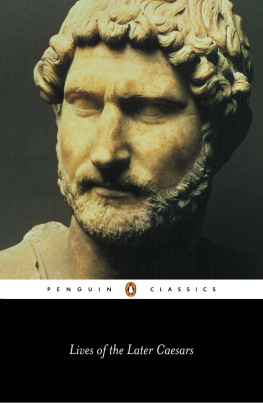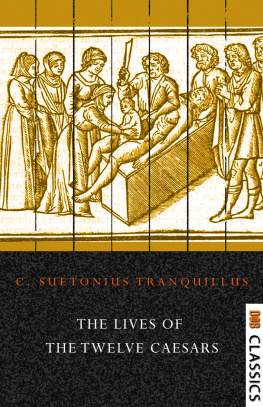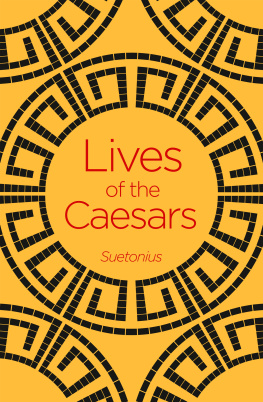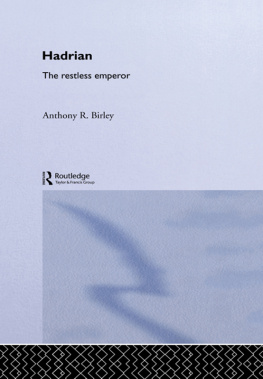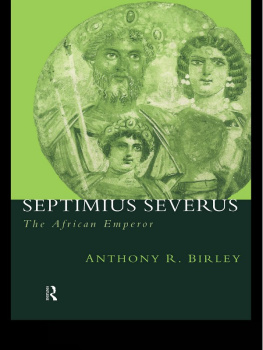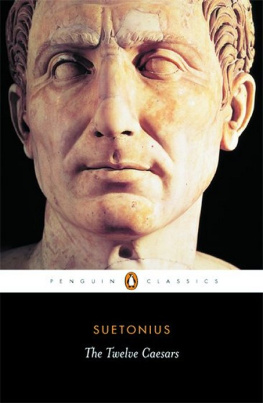Anonymous (transl. Anthony Birley) - Lives of the Later Caesars
Here you can read online Anonymous (transl. Anthony Birley) - Lives of the Later Caesars full text of the book (entire story) in english for free. Download pdf and epub, get meaning, cover and reviews about this ebook. City: New York, year: 2005, publisher: Penguin, genre: Non-fiction. Description of the work, (preface) as well as reviews are available. Best literature library LitArk.com created for fans of good reading and offers a wide selection of genres:
Romance novel
Science fiction
Adventure
Detective
Science
History
Home and family
Prose
Art
Politics
Computer
Non-fiction
Religion
Business
Children
Humor
Choose a favorite category and find really read worthwhile books. Enjoy immersion in the world of imagination, feel the emotions of the characters or learn something new for yourself, make an fascinating discovery.
- Book:Lives of the Later Caesars
- Author:
- Publisher:Penguin
- Genre:
- Year:2005
- City:New York
- Rating:3 / 5
- Favourites:Add to favourites
- Your mark:
- 60
- 1
- 2
- 3
- 4
- 5
Lives of the Later Caesars: summary, description and annotation
We offer to read an annotation, description, summary or preface (depends on what the author of the book "Lives of the Later Caesars" wrote himself). If you haven't found the necessary information about the book — write in the comments, we will try to find it.
Lives of the Later Caesars — read online for free the complete book (whole text) full work
Below is the text of the book, divided by pages. System saving the place of the last page read, allows you to conveniently read the book "Lives of the Later Caesars" online for free, without having to search again every time where you left off. Put a bookmark, and you can go to the page where you finished reading at any time.
Font size:
Interval:
Bookmark:

LIVES OF THE LATER CAESARS
ADVISORY EDITOR: BETTY RADICE
The Augustan History is a mysterious work ostensibly composed by six biographers writing in the late third and early fourth centuries A.D., under the emperors Diocletian and Constantine, and covering the Lives of emperors and usurpers from A.D. 117 to 284 (with a gap from 244 to 253). Most modern scholars now believe that a single author was responsible, writing in the late fourth century and, for obscure reasons, concealing his identity. Fiction predominates in the Lives of the usurpers and other minor figures, and in the whole of the second half of the work. The present translation is of the first half only, from Hadrian to Heliogabalus ( A.D. 117222), but the translator has prefaced it with newly compiled Lives of Nerva and Trajan to fill the gap ( A.D. 96117) between the Augustan History and its prototype, the Twelve Caesars of Suetonius.
A NTHONY B IRLEY was born at Chesterholm, close to Hadrians Wall, in 1937, and was educated at Oxford. After posts at Birmingham and Leeds he became Professor of Ancient History at Manchester in 1974, remaining there until 1990, when he took up a Chair at Dsseldorf in Germany. His other publications include three books on Roman Britain and biographies of Marcus Aurelius and Septimius Severus.
The first part of the Augustan History,
with newly compiled Lives of Nerva and Trajan
TRANSLATED AND INTRODUCED BY
ANTHONY BIRLEY
Penguin Books
PENGUIN BOOKS
Published by the Penguin Group
Penguin Books Ltd, 80 Strand, London WC2R 0RL , England
Penguin Putnam Inc., 375 Hudson Street, New York, New York 10014, USA
Penguin Books Australia Ltd, 250 Camberwell Road, Camberwell, Victoria 3124, Australia
Penguin Books Canada Ltd, 10 Alcorn Avenue, Toronto, Ontario, Canada M4V 3B2
Penguin Books India (P) Ltd, 11 Community Centre, Panchsheel Park, New Delhi 110 017, India
Penguin Books (NZ) Ltd, Cnr Rosedale and Airborne Roads, Albany, Auckland, New Zealand
Penguin Books (South Africa) (Pty) Ltd, 24 Sturdee Avenue, Rosebank 2196, South Africa
Penguin Books Ltd, Registered Offices: 80 Strand, London WC2R 0RL , England
www.penguin.com
This translation first published 1976
25
Copyright Anthony Birley, 1976
All rights reserved
Except in the United States of America, this book is sold subject to the condition that it shall not, by way of trade or otherwise, be lent, re-sold, hired out, or otherwise circulated without the publishers prior consent in any form of binding or cover other than that in which it is published and without a similar condition including this condition being imposed on the subsequent purchaser
ISBN: 978-0-14-193599-7
D ILIGENCE and accuracy are the only merits which an historical writer may ascribe to himself, wrote Gibbon in the preface to The History of the Decline and Fall of the Roman Empire. He went on to make a tentative promise (never fulfilled) to provide a critical account of the authors consulted at the end of the work, when it was completed. At present, he added,
I shall content myself with a single observation. The biographers, who, under the reigns of Diocletian and Constantine, composed, or rather compiled, the lives of the emperors, from Hadrian to the sons of Carus, are usually mentioned under the names of Aelius Spartianus, Julius Capitolinus, Aelius Lampridius, Vulcatius Gallicanus, Trebellius Pollio, and Flavius Vobiscus [sic]. But there is so much perplexity in the titles of the MSS., and so many disputes have arisen among the critics concerning their number, their names, and their respective property, that for the most part I have quoted them without distinction, under the general and well-known title of the Augustan History.
The problem that Gibbon describes may now be regarded as one of the least vexing that afflict students of this strange work. Most are now agreed on number, names and respective property. In 1889 Hermann Dessau produced the remarkable hypothesis Hence, use of the Augustan History cannot be avoided.
The present translation is of the first half of the Augustan History only, the biographies from Hadrian to Elagabalus. I should have liked to tackle the whole, but the first half alone already makes a substantial enough volume. Besides, it is in the first half that one finds a reasonable basis of fact, and the student of Roman imperial history can use the earlier Lives with some profit, if due precautions are taken. The same cannot be said for the second half, where fiction predominates not without considerable charm, to be sure, but dangerously beguiling stuff for the historian. The Twelve Caesars of Suetonius ends with the Life of Domitian, and the Augustan History begins with Hadrian; and there are no extant ancient biographies of Nerva (reigned A.D . 968) and Trajan (reigned A.D. 98117). After some hesitation I have attempted to make good this deficiency by cobbling together extracts from such sources as Cassius Dio, Aurelius Victor and the Epitome de Caesaribus, to produce brief Lives of Nerva and Trajan in the manner of Suetonius or the Augustan History. I have been careful to supply references for every statement and can only hope that the result will be of some interest and utility, and that it will not mislead the unwary.
The Augustan History itself may have originally commenced with biographies of Nerva and Trajan. As it is, the work launches off into the Life of Hadrian with no word of introduction or explanation, and it is not unreasonable to postulate that some pages may have been lost from the beginning of the original manuscript. Certainly, there is apparent evidence of damage to the manuscript later in the work; after the biographies of the emperors of the year 238 there follows what is evidently the concluding portion of a Life of Valerian, dealing with the aftermath of his capture by the Persians in the year 260. Thus the Lives of the emperors between Gordian III (reigned A.D. 23844) and Valerian ( A.D. 25360) are evidently missing. It may be that an opening section covering the years 98117 has also been lost.
Although there is no preface to the work as it stands, before long the author, ostensibly addressing his remarks to the emperor Diocletian, purports to make his intentions and methods explicit: To Diocletian Augustus, his Aelius Spartianus, greeting. I have it in mind, Diocletian Augustus, to bring to the cognizance of Your Divinity, not only those who have held the place of princeps in that position which you maintain, as I have done as far as the Deified Hadrian, but also those who Hence, without some very elaborate theory about his literary activity, Lampridius can hardly be described as a biographer (as he is by Vopiscus) eighteen or more years before he began writing. Vulcacius Gallicanus, in the one biography ascribed to him, addresses Diocletian only, but Aelius Spartianus, after addressing Diocletian on three occasions, suddenly invokes Constantine in the Geta.
Clearly then, even on a cursory inspection, there is something amiss, as Gibbon and his predecessors were well aware. In fact, the biographies are in the wrong order in the manuscripts, with Didius Julianus (emperor in A.D. 193, after Pertinax) preceding Commodus (emperor A.D. 18092); and three other Lives are also misplaced. Hence it might seem possible to imagine that some of the first four authors names might have been wrongly attributed to particular biographies in the manuscripts. But no rearrangement would result in chronological consistency.
Next pageFont size:
Interval:
Bookmark:
Similar books «Lives of the Later Caesars»
Look at similar books to Lives of the Later Caesars. We have selected literature similar in name and meaning in the hope of providing readers with more options to find new, interesting, not yet read works.
Discussion, reviews of the book Lives of the Later Caesars and just readers' own opinions. Leave your comments, write what you think about the work, its meaning or the main characters. Specify what exactly you liked and what you didn't like, and why you think so.

